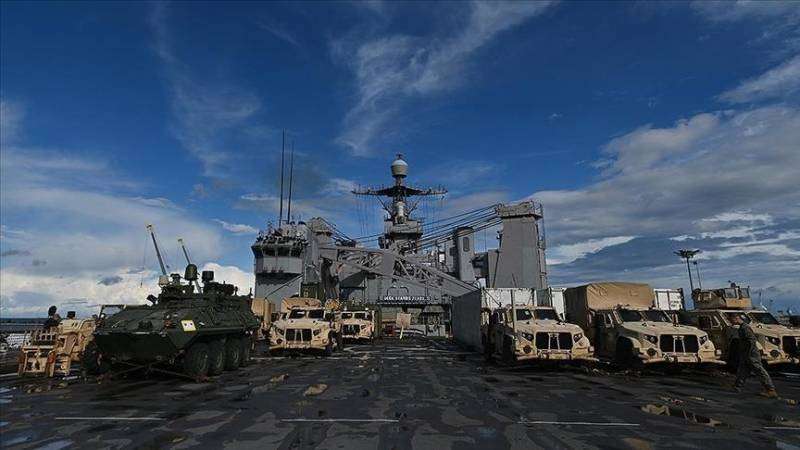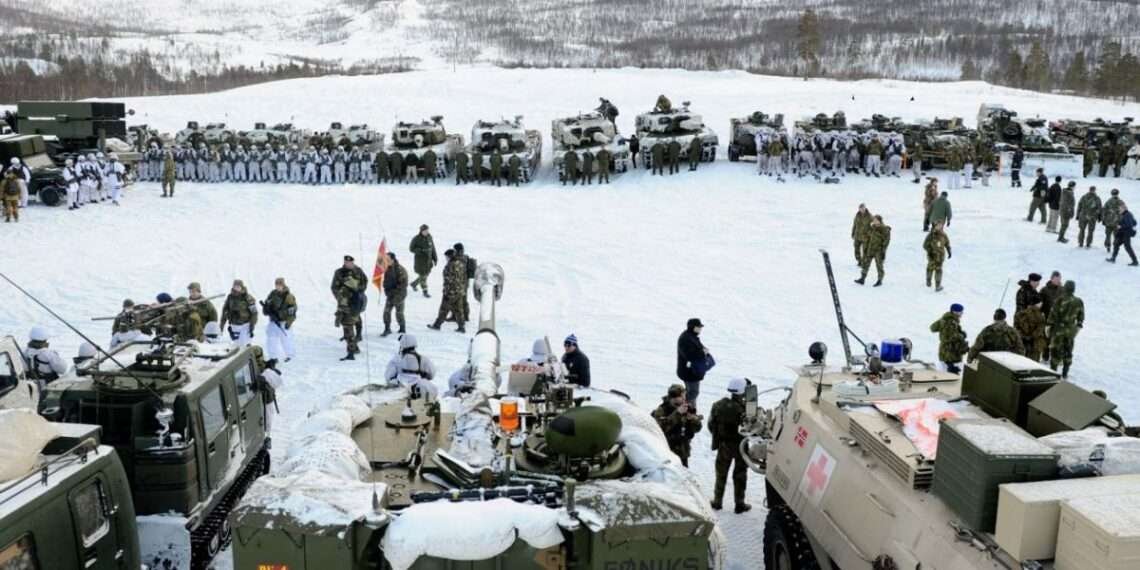A groundbreaking training exercise involving over 20,000 soldiers from 13 nations has kicked off in the northern regions of Norway, Sweden, and Finland, marking a pivotal moment as the area gears up to become fully integrated into NATO territory in the coming days.
Dubbed Nordic Response, this joint defense exercise replaces the formerly named Cold Response, traditionally held in northern Norway—a long-standing NATO member—every other year.
The shift reflects Finland’s recent entry into the Western military alliance and Sweden’s imminent accession.
Running until March 14, the exercise includes air, land, and sea operations, focusing significantly on cross-border exercises within the Arctic Circle.
Among the participating nations are the UK, US, Denmark, France, Germany, Italy, Spain, the Netherlands, Belgium, and Canada, demonstrating a robust multinational commitment to regional defense and security.
The Norwegian military said the exercise was aimed to demonstrate “a unique level of cooperation and interoperability as they cross borders on land, sea and air”.
Nordic Response is part of an ongoing series of NATO exercises, Steadfast Defender, involving 90,000 soldiers. It is also closely aligned with the UK-led naval exercise Joint Warrior, which ran between Scotland, Norway, and Iceland last week.
The latest exercise would involve more than 50 submarines, frigates, corvettes, aircraft carriers, and amphibious vessels at sea, over 100 combat, maritime surveillance, and transport aircraft, and thousands of soldiers on the ground using artillery systems, tanks, and tracked vehicles.
The majority of operations would be concentrated in northern Troms county and the western region of Finnmark county in Norway. However, maritime activities would also extend along the northern coast of the country, with exercises crossing borders into northern Finland and Sweden.
Notable dignitaries, including the newly elected Finnish President Alexander Stubb, Norwegian Prime Minister Jonas Gahr Støre, and Swedish Crown Princess Victoria, are expected to make appearances during the event.
Meanwhile, Sweden is eagerly awaiting approval from Hungary to finalize its NATO membership.
Although there was anticipation that the process could conclude last week, it was delayed until Sunday when it was only signed by the speaker of Hungary’s parliament.
Now, it awaits the signature of the President before the documentation can proceed to Washington for finalization.

On Monday, February 26, Hungary’s parliament approved the historically neutral nation’s NATO membership, nearly two years after it initially submitted its application. Finland had already secured its membership in April of the previous year.
According to the Norwegian military, the Nordic Response exercise was designed to enhance cooperation among Nordic nations, thereby fortifying the alliance’s capacity to protect the region.
According to the Norwegian military, all pertinent nations, including Russia, were notified of the exercise.
“With Finland and soon Sweden as allied neighbors, the exercise contributes to closer Nordic integration within the framework of NATO,” the Norwegian military said in a statement.
It added that “The exercise also strengthens operational total defense cooperation in the Nordic countries, which results in better cooperation in peace, crisis, and conflict. Closer operational cooperation in the Nordic region strengthens NATO’s ability to defend the Nordic region.”
Russia’s Stance On NATO’s Expansion
However, President Vladimir Putin in his annual State of the Nation address on Thursday, February 29 warned the West not to cross a “red line” with Russia. He stated that any such move would trigger an “asymmetrical, rapid, and harsh” response.
Russia’s response strategy characterized by asymmetry, implies that its retaliation might not directly mirror the actions taken against it.
Instead, it could be unconventional and unexpected, strategically exploiting vulnerabilities in the opponent’s approach.
Furthermore, the response would be “rapid”, allowing minimal time for deliberation or negotiation. Additionally, it would be “harsh”, potentially involving severe economic, diplomatic, or military measures.
READ ALSO: Sweden’s Momentous Decision To Join NATO Worth It?





















